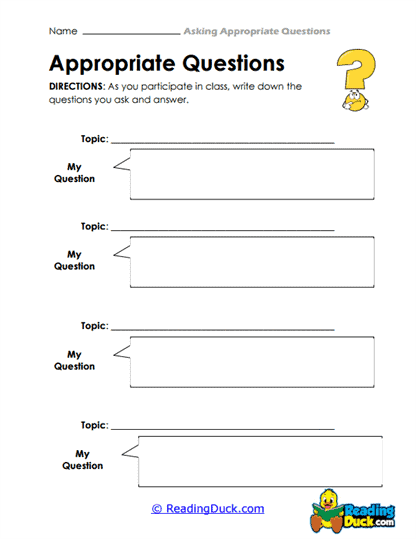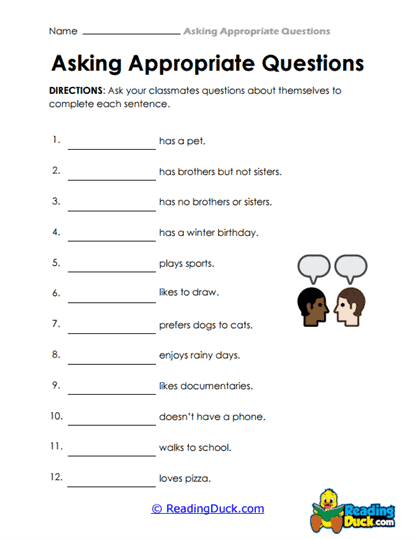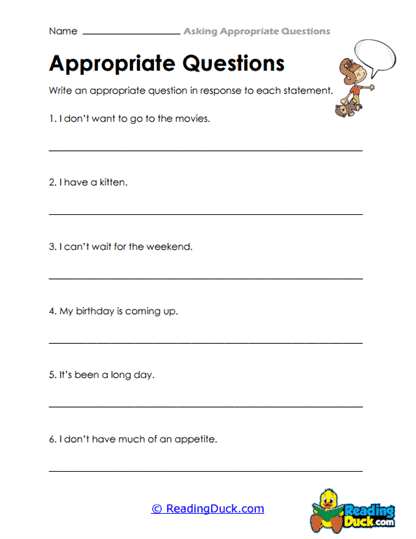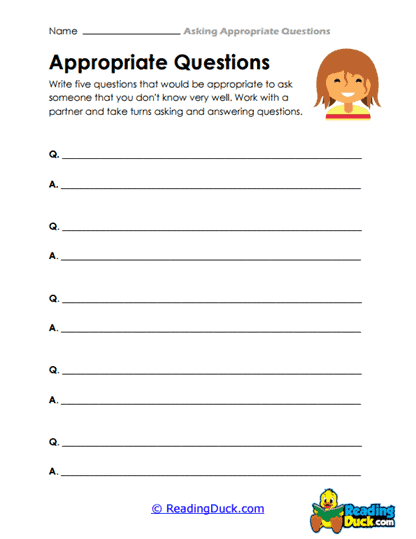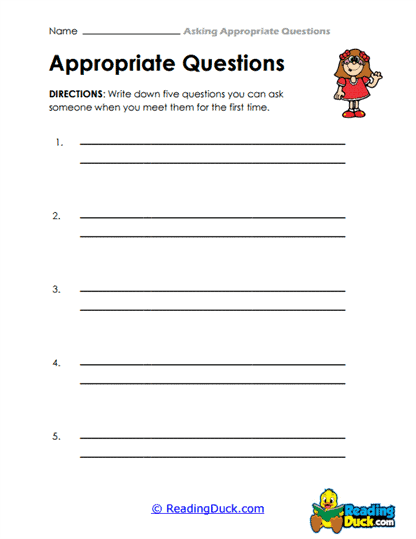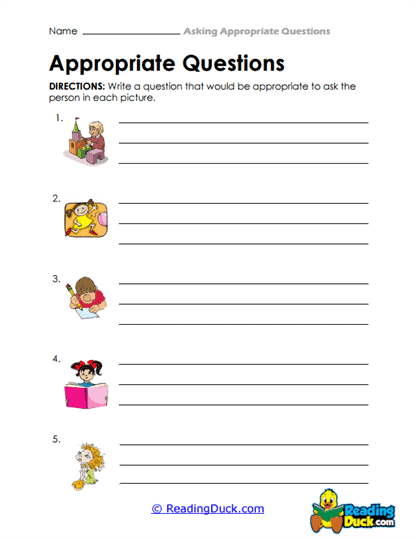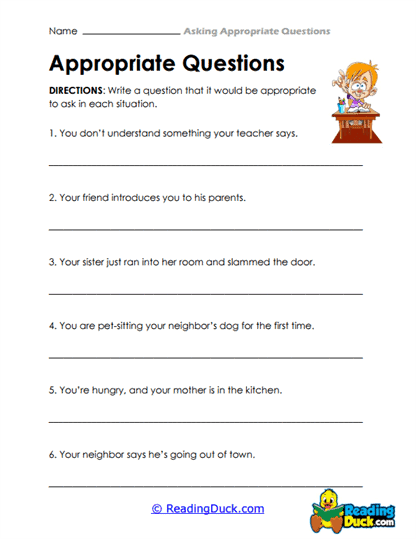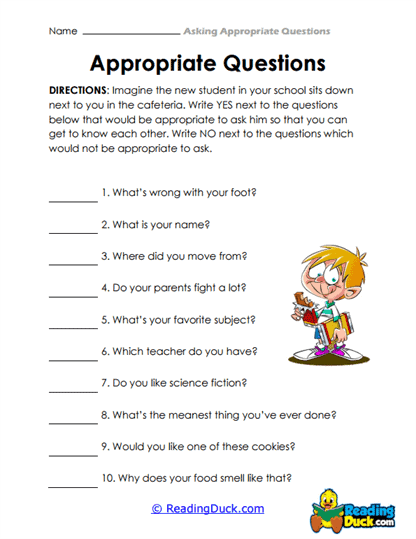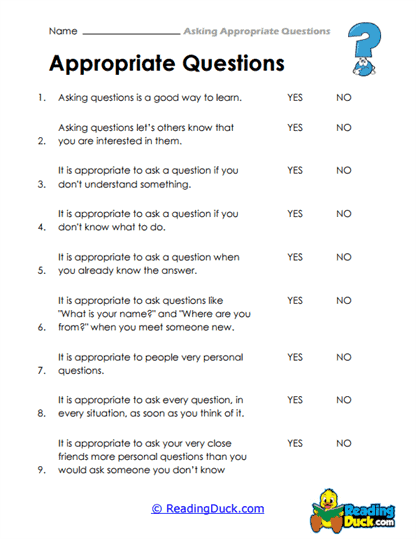Asking Appropriate Questions Worksheets
About Our Asking Appropriate Questions Worksheets
Our collection of Asking Appropriate Questions worksheets provides an essential resource for students to develop one of the most important skills in writing and communication: formulating thoughtful, relevant questions. These worksheets fall under the Writing category within the Skills section, emphasizing the crucial role that questions play in critical thinking, research, and effective dialogue. Whether students are conducting research, engaging in a discussion, or preparing for an interview, knowing how to ask the right questions is fundamental to acquiring and understanding information.
This collection is designed to support learners in a variety of settings, from traditional classrooms to homeschooling and self-study environments. By progressively building their questioning skills, students learn how to seek out the most valuable information and engage more meaningfully with the material they encounter. Educators and parents will find these worksheets invaluable for developing inquiry-based learning, guiding students through the steps of formulating, refining, and asking questions that are relevant, specific, and insightful. Aligned with common educational standards, this collection ensures that students not only enhance their writing skills but also strengthen their overall academic performance and communication abilities.
The Importance of Asking Appropriate Questions in Writing
Teaching the art of asking appropriate questions is fundamental in writing and communication. In a classroom setting, this topic begins with the basic understanding that questions drive exploration, comprehension, and deeper engagement with any subject. A teacher might introduce this concept by explaining that good questions lead to better learning, whether in writing, research, or conversation. Appropriate questions allow students to clarify information, dig deeper into topics, and gather insights that might otherwise remain unexplored.
For example, consider the difference between two types of questions:
- Basic Question: “What is global warming?”
- Appropriate Question: “How does global warming affect different regions of the world, and what steps can be taken to reduce its impact?”
The first question provides general knowledge, while the second question is more specific and leads to a deeper understanding of the issue. By asking appropriate questions, students can gather more relevant information, foster critical thinking, and improve their ability to engage in meaningful discussions.
The worksheets in this collection guide students through various exercises designed to enhance their ability to ask questions that are thoughtful, clear, and targeted. For example, one worksheet may present students with a passage of text and prompt them to formulate three questions that would deepen their understanding of the topic. Another worksheet might focus on converting vague or overly broad questions into more specific and focused inquiries. By mastering these techniques, students gain the tools to enhance their learning across all subjects.
Building Essential Writing and Inquiry Skills
The Asking Appropriate Questions worksheets focus on developing a set of core skills that are essential for academic success, not just in writing but in all areas of learning. These worksheets are designed to help students practice and refine their questioning abilities, which in turn strengthens their critical thinking and comprehension.
Some of the key skills these worksheets build include:
- Clarity and Precision: Students learn how to ask questions that are clear and precise, avoiding vague or overly general inquiries. This skill is vital in writing, as clear questions lead to more focused and relevant answers.
- Depth of Inquiry: By practicing how to ask deeper, more insightful questions, students move beyond surface-level understanding. They learn to engage with the material in a way that fosters a deeper exploration of concepts, issues, and ideas.
- Research and Investigation: The worksheets encourage students to formulate questions that drive research, teaching them how to frame inquiries that guide their investigation of a topic. Whether they are preparing for a research project, an interview, or a debate, asking the right questions ensures that they gather the most relevant and useful information.
- Critical Thinking: Crafting appropriate questions requires students to analyze information and think critically about what they want to know and why. The process of developing questions prompts students to evaluate the material from different angles, fostering a more nuanced understanding of the subject matter.
For example, one worksheet might ask students to read a short article on a scientific topic, then generate questions that would help them research further. Another worksheet may guide students through the process of refining broad questions into more focused ones, teaching them how to narrow their inquiries to target specific aspects of a topic.
Adaptable for Any Learning Environment
The Asking Appropriate Questions worksheets are designed with adaptability in mind, making them useful in a wide range of learning environments. Whether in a traditional classroom, a homeschooling setting, or for self-study, these worksheets offer a flexible tool for building essential inquiry and writing skills.
- Classroom Use: Teachers can easily integrate these worksheets into their lesson plans, whether as part of a writing unit, a research project, or a discussion-based activity. They can serve as standalone exercises or be incorporated into larger assignments where questioning is a key component, such as preparing for debates or writing essays.
- Homeschooling: Parents who homeschool can use these worksheets to foster curiosity and independent learning in their children. By guiding students through the process of asking questions, parents can encourage deeper engagement with learning materials and help their children develop critical thinking skills.
- Self-Study: For independent learners, these worksheets offer a structured way to practice asking questions, enhancing their research and writing skills. Students can work through the exercises at their own pace, gradually developing their ability to ask questions that lead to deeper understanding and more focused exploration.
The worksheets' flexibility makes them suitable for both individual and group work, allowing learners to practice their questioning skills in a variety of contexts and at different levels of difficulty.
Supporting Differentiated Instruction for Diverse Learners
The Asking Appropriate Questions worksheets are designed to support differentiated instruction, ensuring that all learners can benefit from these activities, regardless of their ability level. Educators can adjust the exercises to meet the needs of individual students, ensuring that each learner is challenged appropriately and supported in their development.
- For Beginners: Teachers can start with simple, close-ended questions to introduce the concept of asking appropriate questions. Students who need extra support can practice turning simple yes/no questions into more open-ended ones, helping them develop a stronger understanding of how to ask questions that promote discussion and exploration.
- For Advanced Learners: More proficient students can be challenged with complex, open-ended questions that require them to think critically and analytically. These learners can practice generating research questions, refining them to focus on specific issues or problems. Teachers can also assign tasks where advanced students must evaluate and critique questions, determining which ones are most likely to lead to meaningful answers.
The worksheets offer varying levels of difficulty, making them suitable for learners across a wide spectrum of abilities. By supporting differentiated instruction, they ensure that every student can build their questioning and writing skills in a way that is appropriate for their current level.
Integrating Worksheets into Lesson Plans and Group Activities
These worksheets are not only valuable for individual practice but also for enhancing group work and collaborative learning. Teachers can incorporate them into various lesson plans or use them as supplemental material to reinforce key concepts in writing and inquiry.
- Group Work: The worksheets can be used to encourage group discussions, where students work together to generate questions about a particular topic. This collaborative process helps students learn from each other, sharing different perspectives and approaches to formulating questions. For example, students might work in pairs to create a list of questions for a research project, then share their questions with the class for feedback.
- Creative Extensions: Teachers can extend the learning experience by encouraging students to create their own question-based projects. For example, students might design a survey, conduct interviews, or write a research paper that begins with a series of well-crafted questions. These creative extensions help students apply their questioning skills in real-world scenarios, deepening their understanding of the material.
By integrating these worksheets into a range of activities, teachers can enhance student engagement and foster a more interactive and inquiry-based learning environment.
Our Asking Appropriate Questions worksheets provide a powerful tool for developing essential writing and inquiry skills. Through targeted exercises, students learn how to formulate clear, thoughtful, and insightful questions that lead to deeper learning and stronger communication. With their flexibility, adaptability, and alignment with educational standards, these worksheets are a valuable resource for teachers, parents, and students in a wide variety of learning contexts.
